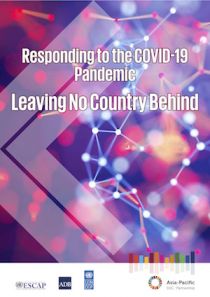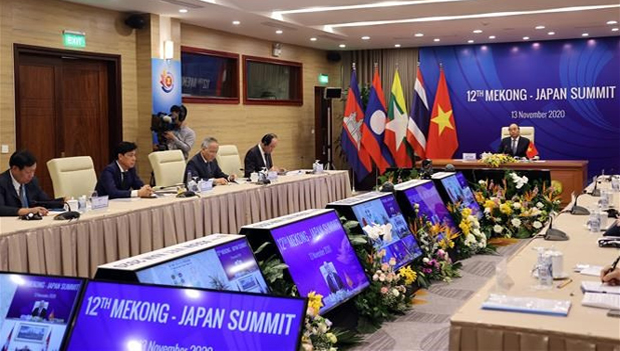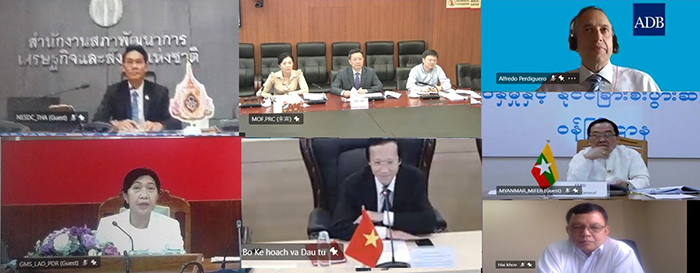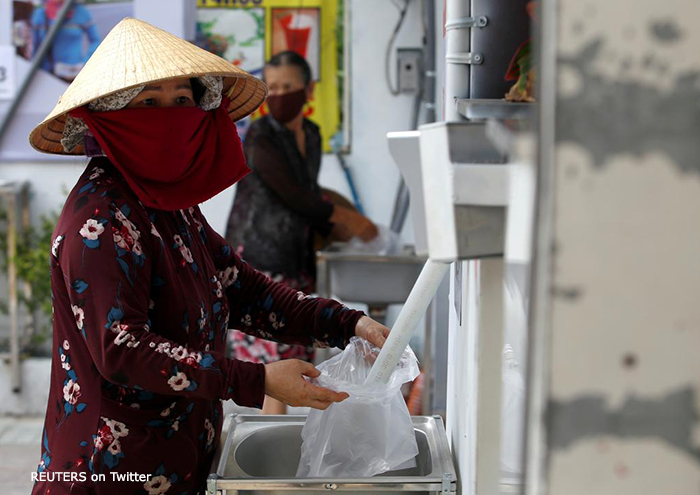
Responding to the COVID-19 Pandemic: Leaving No Country Behind
This report examines the implications of the coronavirus disease (COVID-19) pandemic for the Sustainable Development Goals, and opportunities for recovery.
Information and communication technology (ICT) is helping to transcend geographic boundaries across the Greater Mekong Subregion.
More and more people have access to phones and the internet, enabling individuals, communities, and businesses to connect and collaborate as never before. The countries in the Greater Mekong Subregion (GMS) recognize the importance of investing in ICT to improve productivity and efficiency, build knowledge-based economies, and reduce poverty.
Under the GMS Program, cooperation in this sector has contributed to a subregional “information superhighway” based on interconnected telecommunications infrastructure. The countries are now leveraging ICT to make the GMS more economically integrated and competitive.
In 2015, the GMS Cross-Border E-Commerce Cooperation Platform was established, followed a year later by the GMS E-Commerce Business Alliance. Together, these two initiatives are boosting intraregional trade through policy exchanges, enterprise interaction, and capacity building.
Related
Focal Persons at the Asian Development Bank
Pinsuda Alexander
Regional Cooperation and Integration Unit
Southeast Asia Department
Arun Ramamurthy
Transport Sector Office
Sectors Group
Other Concerned Staff & Consultants
Rafaelita Jamon
Regional Cooperation and Integration Unit
Southeast Asia Department/GMS Secretariat
Send inquiries to GMS Secretariat.

This report examines the implications of the coronavirus disease (COVID-19) pandemic for the Sustainable Development Goals, and opportunities for recovery.

Parks and scenic areas in Beijing, PRC, have taken measures to control the number of visitors and limit them to 40% of the same period of previous years. Photo by ADB.
The Fourth Meeting of the Greater Mekong Subregion (GMS) Urban Development Working Group (UDWG-4) was held via web-based conferencing on 17 December 2020. Mr. Xu Jianping, Director General, Department of Regional Opening-up, National Development and Reform Commission (NDRC) of the People’s Republic of China (PRC), chaired the meeting with Mr.
The Asian Development Bank (ADB) and its partners will collectively zero in on strategies and policy responses that countries can adopt to lay the groundwork for post-COVID-19 recovery at the upcoming Southeast Asia Development Symposium (SEADS) Innovation through Collaboration: Planning for Inclusive Post-COVID-19 Recovery.
The first Friends of the Mekong Policy Dialogue under the new Mekong-U.S. Partnership was convened by the United States of America (USA) and Viet Nam on 12 January 2021.
Cambodia should consider developing industry transformation maps in key sectors to enable the transition to the fourth industrial revolution (4IR) with adequate investment in skills development for new and repositioned jobs, according to a new study by the Asian Development Bank (ADB).
Leaders of Cambodia, Lao PDR, Myanmar, Thailand, and Viet Nam adopted the Phnom Penh declaration at the 9th Ayeyawady-Chao Phraya-Mekong Economic Cooperation Strategy (ACMECS) Summit held on 9 December. The declaration emphasizes post-pandemic socio-economic recovery and preparation for future crises and challenges through public health cooperation and enhanced supply chains. ACMECS leaders stressed the importance of vaccine multilateralism to ensure equitable and safe access to coronavirus disease (COVID-19) vaccines.

The 12th Mekong-Japan Summit took place virtually on 13 November as part of the 37th ASEAN Summit and Related Summits. Photo by VNA via VNExplorer.
Japan and Mekong countries convened the 12th Mekong-Japan Summit on 13 November, cochaired by Japan Prime Minister Suga Yoshihide and Viet Nam Prime Minister Nguyen Xuan Phuc. The meeting underscored Japan’s strong commitment to the Mekong subregion and reviewed progress of cooperation between Japan and Mekong countries (Cambodia, Lao People’s Democratic Republic [PDR], Thailand, Myanmar, and Viet Nam) as guided by the "Tokyo Strategy 2018." The Strategy seeks to strengthen connectivity, improve human resource development, and enhance environmental protection.

Top row, left to right: Dr. Danucha Pichayanan, Deputy Secretary General, Office of the National Economic and Social Development Council (Thailand); Mr. Liu Weihua, Deputy Director General, Department of International Economic and Financial Cooperation, Ministry of Finance (PRC); Mr. Alfredo Perdiguero, Director, SERC, ADB. Middle row: Mr. Than Aung Kyaw, Director General, FERD, Ministry of Investment and Foreign Economic Relations (Myanmar). Bottom row, left to right: Ms. Sisomboun Ounavong, Director General, Department of International Cooperation, Ministry of Planning and Investment (Lao PDR); Dr. Pham Hoang Mai, Director General, Foreign Economic Relations Department, Ministry of Planning and Investment (Viet Nam); and H.E. Mr. Ros Seilava, Secretary of State, Ministry of Economy and Finance (Cambodia)
A GMS Senior Officials Meeting (SOM) was held on 11 September 2020 via web-based conferencing to review (i) proposed key GMS strategic planning documents and knowledge products, which includes GMS COVID-19 response initiatives and the new long-term strategy for the GMS program, and (ii) preparations for upcoming GMS events—the 11th Economic Corridors Forum (ECF-11), the 24th GMS Ministerial Conference (MC-24), and the 7th GMS Summit (Summit-7).
Cambodia, Lao People’s Democratic Republic (PDR), Myanmar, and Viet Nam (CLMV) economic ministers endorsed the CLMV Action Plan 2021-2022 focusing on (i) trade and investment cooperation, (ii) implementation of regional commitments, (iii) pandemic recovery plan, (iv) Framework for CLMV Development, and (v) human resource development.

A 24/7 automatic dispensing machine provides free rice for people out of work following the lockdown. This was spearheaded by a Vietnamese entrepreneur in Ho Chi Minh City. Photo by Reuters on Twitter.
An initiative by the Mekong Tourism Coordinating Office (MTCO), Destination Mekong, and the Mekong Institute (MI) taps individuals' help in crowdsourcing newly-spotted innovations on how the coronavirus disease (COVID-19) is being managed and/or overcome in the Greater Mekong Subregion (GMS).